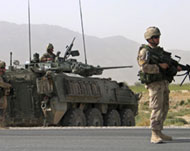UK urges wider Nato Afghan effort
Britain has given warning that the credibility of Nato was at stake in Afghanistan after it was surprised by the strength of resistance from the Taliban, the country’s former conservative Muslim rulers.

In a speech in London to the Royal United Services Institute on Tuesday, Des Browne, the British defence secretary, underlined the need for London’s allies to share the burden of fighting in the volatile south of the war-scarred country.
Britain remains confident of ultimate victory despite a recent surge in deadly violence, he said.
But he admitted: “We do have to accept that it’s been even harder than we expected.
“The Taliban’s tenacity in the face of massive losses has been a surprise, absorbing more of our effort than we predicted it would and consquently slowing progress in reconstruction”.
Britain took over command of Nato forces in the volatile south of Afghanistan in May, and have faced fiercer-than-anticipated resistance from Taliban insurgents.
A total of 33 British troops have died since then, compared to a total of 40 since Nato moved into Afghanistan in 2001 in the wake of the September 11, 2001, terror attacks in the US.
Extra forces
Nato’s top commander-General James Jones has called for an extra 2,500 troops in Afghanistan, and Poland vowed last week to boost its contingent there from 120 troops to about 1,000 by next February.
Browne welcomed the Polish offer, but reiterated the need for all 26 Nato members to commit themselves to the task of bringing peace and stability to the war-ravaged country, despite the heavy losses.
He said there were “understandable concerns” in Nato capitals at bolstering the reconstruction and stability force in Afghanistan because of the risks posed to troops in the country.
 |
|
Canadian soldiers have been |
Browne said: “But those of us who are already fully committed in the south – ourselves, the Canadians, the Dutch and the Estonians and the ever-present Americans – must remind our partners that it was their agreement of support that brought us to this point.
“The mission is vital, as it has always been. In fact, it is vital not only for Afghanistan but also for the threat that a lawless Afghanistan poses to the region and to the world and also, now that Nato has taken it on, for Nato’s own credibility,” he said.
In a question-and-answer session after the speech, Browne called on neighbouring Pakistan to step up its efforts to stem the flow of fighters and aid crossing the notoriously porous border.
Many believe that al-Qaeda leader Osama bin Laden could still be holed up somewhere in the border region, much of which is beyond the reach of government control.
Pakistan factor
“Pakistan is part of the problem but it is also part of the solution,” said the British minister, adding that Islamabad “needs to accept its responsibility”.
Browne said the “fundamental point” was that Nato is an alliance and that when it decides to use military force “all partners should be prepared to face equal risk”.
He said “we must persuade our partners and help them to persuade their publics” about the task in hand and help push the message to the Afghan people that Nato was there to effect “real change” across the whole of society.
“Nato nations must decide whether to back their investment, reaffirm their original intent and to send a clear signal to the Taliban and to the Afghan population that Nato has an alliance as strong and determined to see the task through,” he added.